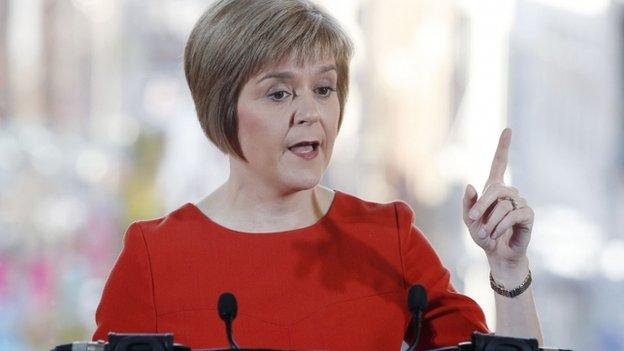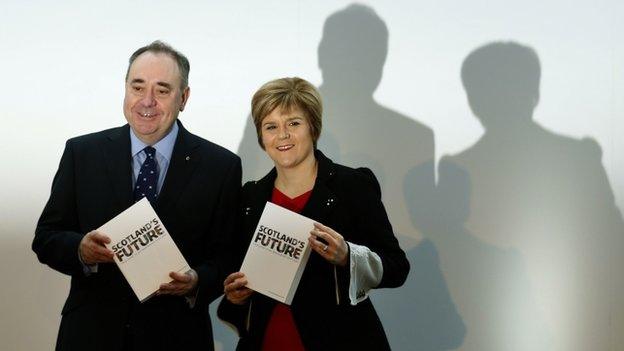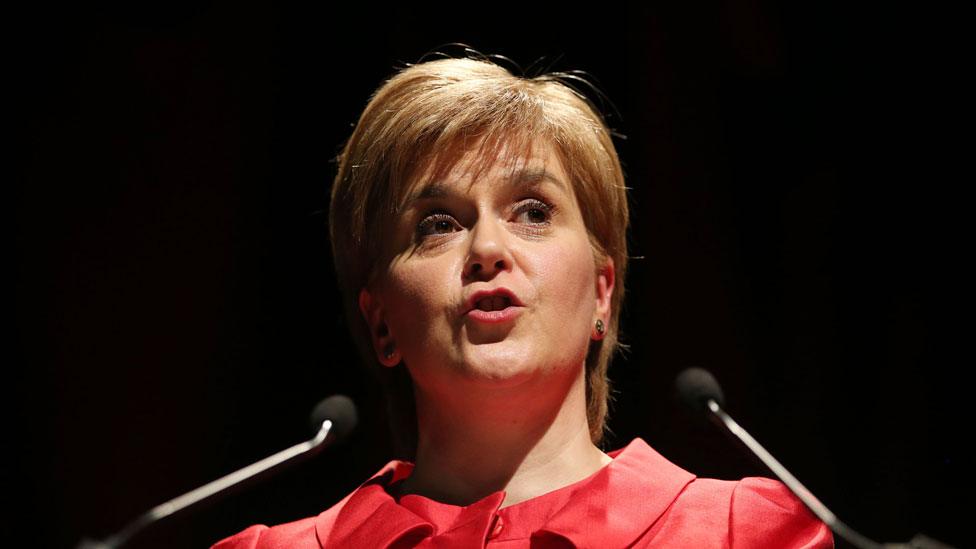Nicola Sturgeon to become new SNP leader
- Published
Nicola Sturgeon says it will be "an enormous privilege" to succeed Alex Salmond as SNP leader and Scottish first minister
Nicola Sturgeon will succeed Alex Salmond as leader of the SNP, after becoming the only person to put her name forward for the job.
Ms Sturgeon, also set to become Scotland's first female first minister, pledged to ensure more powers were delivered to the Edinburgh parliament.
She also announced plans to hold a series of rallies across Scotland.
Ms Sturgeon, currently deputy SNP leader, will take up her new job at the party's November conference.
The move came after Mr Salmond's decision to stand down as SNP leader and first minister after the vote against independence in September's referendum.
Ms Sturgeon told the BBC she would have "relished" a leadership contest, but said she was "honoured" to have been chosen by the party as its leader.
Asked what she would do if the Westminster parties failed to deliver more powers for Scotland, Ms Sturgeon responded: "If Westminster renege on those promises, then it is not a case of what I will do to them - it is a case of what the Scottish people will do.

Ms Sturgeon confirmed her intention to succeed Mr Salmond at an event last month
"The Scottish people would ensure [Westminster parties] would pay a heavy, heavy electoral price."
Meanwhile, Ms Sturgeon said her tour of Scotland would begin on 29 October in Edinburgh and end on 7 December in Aberdeen.
The series of rallies - which includes a stop-off in November at Glasgow's 12,000-capacity SSE Hydro - are aimed at the 50,000 new members the SNP has signed up since last month's referendum.
"Our new members bring a new energy and dynamism - and not just to the SNP," Ms Sturgeon said," adding: "They are also a potent force who can help Scotland progress as a country.
"I am looking forward to meeting as many of our new recruits as possible and sharing with them my vision for the future."

Analysis: Andrew Black, BBC Scotland political reporter
It may have been more of a coronation than a competition but, after years of speculation, we can now say that Nicola Sturgeon will be the next leader of the Scottish National Party and, by association, Scotland's next first minister.
The "No" vote in September's independence referendum was a bitter blow for the SNP, but Ms Sturgeon is now trying to show her party's ready to move on from defeat.
How will she do that? First up, with a pledge to hold David Cameron to his word and deliver substantial new powers to the devolved Scottish Parliament.
Ms Sturgeon's also looking to capitalise on the massive surge in SNP membership - up from 25,000 on 18 September to more than 80,000 (and rising) - by going on a Scottish tour to show she's the leader, not just of her party, but of the whole nation.
One of her key headline dates during this post-Salmond era will be an appearance at Glasgow's 12,000 capacity SSE Hydro in November, as the party seeks to show people that, despite the outcome of the referendum, the SNP isn't going anywhere.
Apart from that, Ms Sturgeon - once she is voted in as first minister by parliament - still has Scotland's devolved government to run and, beyond that, will be taking the SNP into the 2016 Scottish election, in which the party will seek an unprecedented third term in office.
Before that, her first electoral test comes with the UK election next May - a contest in which the SNP will be seeking to send MPs to a parliament which it says has failed to serve the people of Scotland, yet plays a vital role in delivering more powers to Holyrood.
And yes, there will be questions about whether there should have been an SNP leadership contest, rather than Ms Sturgeon standing as the sole candidate. In reality, there wasn't really any other name in the frame to succeed Alex Salmond.
Ms Sturgeon will also need to deal with the tricky issue thrown up by her opponents - the timescale for a possible future independence referendum, previously described by her government as a "once in a generation" event.
She's not ruling it out, but right now Ms Sturgeon says her main focus is on strengthening the powers of the Scottish Parliament and holding her old adversaries - the Conservatives - to account.
During Scottish Questions at Westminster today, Tory Minister David Mundell congratulated Ms Sturgeon, the first woman to lead the SNP, on following in the footsteps of Margaret Thatcher.
SNP Westminster leader Angus Robertson pointed out the key difference there was that the SNP is Scotland's most popular political party, while the Conservatives, with their one MP, are far less so.
And that's the way Ms Sturgeon wants to keep it.

Ms Sturgeon's appointment as first minister still needs the approval of parliament, but the SNP's majority at Holyrood will ensure it goes through.
Speaking at a Scottish Trades Union Congress event in Glasgow, Mr Salmond said Ms Sturgeon was "well capable of dealing with any events in the future".
He added: "But what I would like to say is congratulations to her, I think she will be an outstanding leader of the Scottish National Party and an outstanding first minister of Scotland.
"Of course that has to be elected by the parliament, but I think Scotland's first woman first minister will be an outstanding first minister."
SNP business convener Derek Mackay said he was "delighted" that Ms Sturgeon will succeed Mr Salmond as leader.
He added: "The party is in great heart and relishing the opportunities ahead.

Ms Sturgeon regards Mr Salmond as her mentor, and has served as his deputy since 2007
"We enjoy a lead in voting intentions for both the next Westminster and Holyrood elections, with a record number of members bringing new energy, commitment and enthusiasm to our ranks."
Scottish Labour leader Johann Lamont said: "I warmly welcome and congratulate Nicola Sturgeon on the confirmation that she will be the new leader of the SNP, and believe it to be a positive step that the three main parties in Scotland will all be led by women."
But she added: "Tours of the country speaking to your own supporters will only do so much.
"If, as expected, Nicola Sturgeon is voted in as first minister she will have to lead the whole country not just those that vote SNP."
Scottish Conservative MSP Alex Johnstone asked how the SNP could claim to be Scotland's most democratic party when Ms Sturgeon became leader unopposed.
"We all know how keen the SNP leadership were on keeping the monarchy and that seems to extend to adopting a similar succession model for their new leader," he said.
Meanwhile, three candidates are vying to replace Ms Sturgeon as SNP deputy leader in a contest being decided by a vote of party members.
Scottish Transport Minister Keith Brown, who is seen as a front runner in the contest, is up against Youth Employment Secretary Angela Constance and SNP Treasury spokesman Stewart Hosie.
The winner be declared at the SNP annual conference, being held in Perth.
- Published26 May 2017
